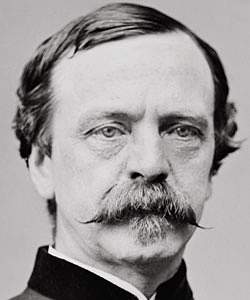Daniel Edgar Sickles (Congressional Biographical Directory)
Reference
SICKLES, Daniel Edgar, a Representative from New York; born in New York City October 20, 1819; attended New York University; apprenticed as a printer; studied law; was admitted to the bar in 1846 and commenced practice in New York City; member of the State assembly in 1847; corporation attorney in 1853; secretary of the legation at London by appointment of President Franklin Pierce 1853-1855; member of the State senate in 1856 and 1857; elected as a Democrat to the Thirty-fifth and Thirty-sixth Congresses (March 4, 1857-March 3, 1861); was not a candidate for renomination in 1860; served in the Civil War as colonel of the Seventeenth Regiment, New York Volunteer Infantry, and brigadier general and major general of Volunteers; retired with rank of major general April 14, 1869; awarded the Medal of Honor October 30, 1897, for action at the Battle of Gettysburg; intrusted with a special mission to the South American Republics in 1865; chairman of the New York State Civil Service Commission in 1888 and 1889; sheriff of New York City in 1890; elected as a Democrat to the Fifty-third Congress (March 4, 1893-March 3, 1895); unsuccessful for reelection in 1894 to the Fifty-fourth Congress; resided in New York City until his death there May 3, 1914; interment in Arlington National Cemetery.
“Sickles, Daniel Edgar,” Biographical Directory of the United States Congress, 1774 to Present, http://bioguide.congress.gov/scripts/biodisplay.pl?index=S000402.
Daniel Edgar Sickles (American National Biography)
Scholarship
In 1847 Sickles won election to the New York State Assembly. Six years later, in January 1853 he was appointed corporation counsel of New York City, but he resigned after eight months to become secretary of the American legation in London. While serving under Ambassador James Buchanan, Sickles had a hand in drawing up the notorious Ostend Manifesto, the document that claimed America's right to seize Cuba, thereby embarrassing the Franklin Pierce administration. While attending a U.S. Independence Day dinner in Richmond on the Thames in 1854, in a spate of nationalistic fervor, Sickles refused to rise from his seat when a toast was offered to Queen Victoria; this affront to British dignity caused an outcry on both sides of the Atlantic.
Sickles returned to New York later in 1854 and resumed his law practice. After winning a seat in the New York Senate (1855-1857), the rising Democrat won election to the U.S. House of Representatives (1857-1861). It was during his stay in Washington, D.C., that Sickles first attracted widespread national fame. Although he had married sixteen-year-old Teresa Bagioli in 1852 and fathered a child, Sickles was widely known for his infidelity and womanizing. Teresa started an extramarital affair of her own with Philip Barton Key, the U.S. attorney for the District of Columbia and son of "Star-Spangled Banner" author Francis Scott Key. Once Sickles was informed of his wife's affair, he took matters into his own hands. On 27 February 1859, as Key loitered near Sickles's house on Lafayette Square, Sickles confronted Key and shot him dead.
Sickles returned to New York later in 1854 and resumed his law practice. After winning a seat in the New York Senate (1855-1857), the rising Democrat won election to the U.S. House of Representatives (1857-1861). It was during his stay in Washington, D.C., that Sickles first attracted widespread national fame. Although he had married sixteen-year-old Teresa Bagioli in 1852 and fathered a child, Sickles was widely known for his infidelity and womanizing. Teresa started an extramarital affair of her own with Philip Barton Key, the U.S. attorney for the District of Columbia and son of "Star-Spangled Banner" author Francis Scott Key. Once Sickles was informed of his wife's affair, he took matters into his own hands. On 27 February 1859, as Key loitered near Sickles's house on Lafayette Square, Sickles confronted Key and shot him dead.
Richard A. Sauers, "Sickles, Daniel Edgar," American National Biography Online, February 2000, http://www.anb.org/articles/05/05-00714.html.








